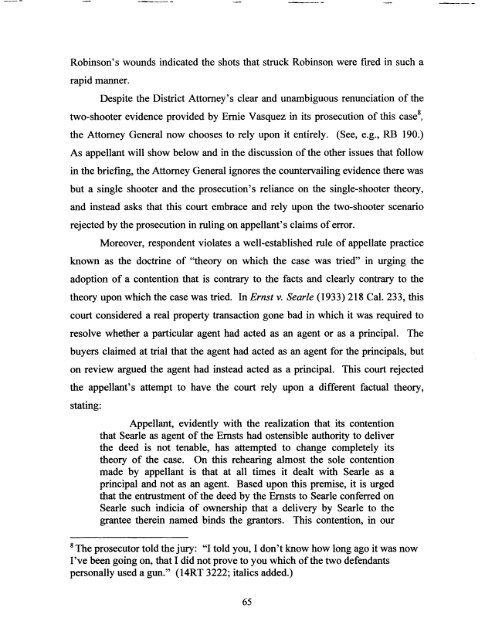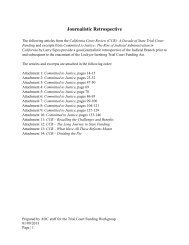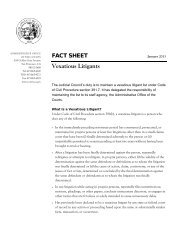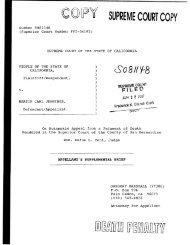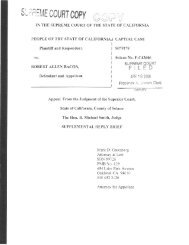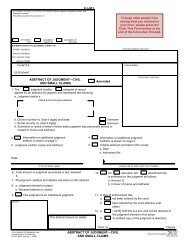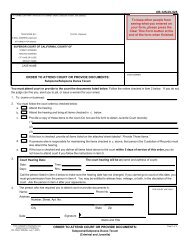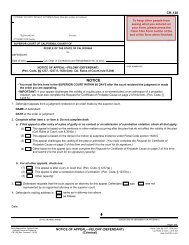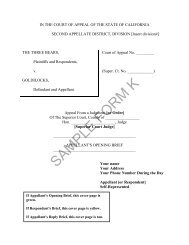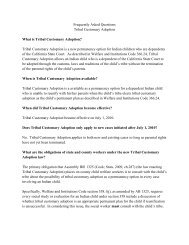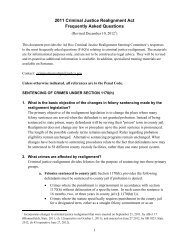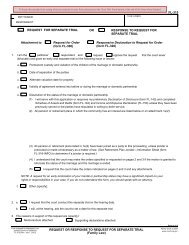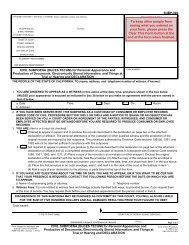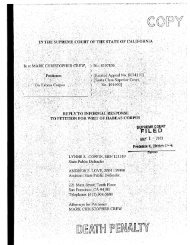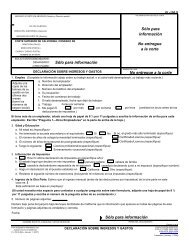Appellant, William Satele, Reply Brief - California Courts - State of ...
Appellant, William Satele, Reply Brief - California Courts - State of ...
Appellant, William Satele, Reply Brief - California Courts - State of ...
Create successful ePaper yourself
Turn your PDF publications into a flip-book with our unique Google optimized e-Paper software.
Robinson's wounds indicated the shots that struck Robinson were fired in such a<br />
rapid manner.<br />
Despite the District Attorney's clear and unambiguous renunciation <strong>of</strong> the<br />
two-shooter evidence provided by Ernie Vasquez in its prosecution <strong>of</strong> this case 8 ,<br />
the Attorney General now chooses to rely upon it entirely. (See, e.g., RB 190.)<br />
As appellant will show below and in the discussion <strong>of</strong>the other issues that follow<br />
in the briefmg, the Attorney General ignores the countervailing evidence there was<br />
but a single shooter and the prosecution's reliance on the single-shooter theory,<br />
and instead asks that this court embrace and rely upon the two-shooter scenario<br />
rejected by the prosecution in ruling on appellant's claims <strong>of</strong>error.<br />
Moreover, respondent violates a well-established rule <strong>of</strong> appellate practice<br />
known as the doctrine <strong>of</strong> "theory on which the case was tried" in urging the<br />
adoption <strong>of</strong> a contention that is contrary to the facts and clearly contrary to the<br />
theory upon which the case was tried. In Ernst v. Searle (1933) 218 Cal. 233, this<br />
court considered a real property transaction gone bad in which it was required to<br />
resolve whether a particular agent had acted as an agent or as a principal. The<br />
buyers claimed at trial that the agent had acted as an agent for the principals, but<br />
on review argued the agent had instead acted as a principal. This court rejected<br />
the appellant's attempt to have the court rely upon a different factual theory,<br />
stating:<br />
<strong>Appellant</strong>, evidently with the realization that its contention<br />
that Searle as agent <strong>of</strong> the Ernsts had ostensible authority to deliver<br />
the deed is not tenable, has attempted to change completely its<br />
theory <strong>of</strong> the case. On this rehearing almost the sole contention<br />
made by appellant is that at all times it dealt with Searle as a<br />
principal and not as an agent. Based upon this premise, it is urged<br />
that the entrustment <strong>of</strong>the deed by the Emsts to Searle conferred on<br />
Searle such indicia <strong>of</strong> ownership that a delivery by Searle to the<br />
grantee therein named binds the grantors. This contention, in our<br />
8 The prosecutor told the jury: "I told you, I don't know how long ago it was now<br />
I've been going on, that I did not prove to you which <strong>of</strong>the two defendants<br />
personally used a gun." (14RT 3222; italics added.)<br />
65


